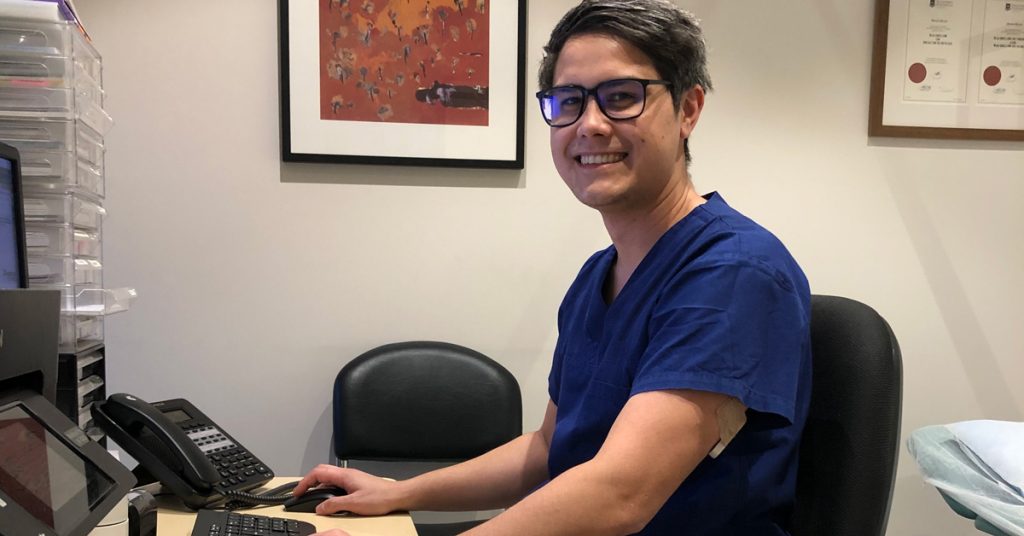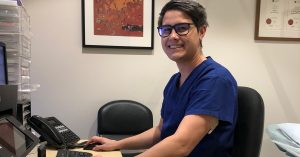Inspired to make a positive contribution to the Clifton Hill community, Dr. Martin Huynh decided to become a GP. As GP at Wellness Medicine, Dr. Huynh enjoys creating “long term therapeutic relationships” with his patients, providing them with the utmost care.
Dr. Huynh is continually researching the latest in medical advancements and treatments, to ensure that his patients receive not only genuine care and support when they need it, but best practice treatments and advice for their symptoms.

Get to know Wellness Medicine GP and Clifton Hill ‘native’ Dr Martin Huynh.
Q. What attracted you to medicine and becoming a GP?
I don’t come from a medical family as such, with mum being a teacher and my dad being a mechanic, however, I was inspired to pursue a career in medicine after seeing my brother go through medical training and become a GP who made a positive impact within our community.
In terms of general practice, I appreciate being able to practice throughout a whole person’s life cycle – creating long term meaningful therapeutic relationships.
I also appreciate the variety of work as a GP, you never know what is about to walk through the door – which keeps you on your toes and certainly keeps things interesting. I am also very keen on keeping up to date with the latest evidence and, and materials so that I’m constantly learning things on the job as well as from my patients.
Q. How long have you been at Wellness Medicine and what do you like most about working there?
I have been here for about a year now. I love working in Clifton Hill, it is a really great community,even though it is in inner-city Melbourne, it has a small-town feel about it and everyone is in that community together. Having grown up in the area, before studying medicine in Queensland, I am familiar with the demographic and it’s just definitely a community that I enjoy working with. The practice itself is a great practice that’s well established within the community and I appreciate working closely with the highly experienced staff at Wellness Medicine.
Q. What do you think will be the biggest changes and challenges facing GPs in the next five to 10 years?
One of the big things we’re going to see, which has been being brought forward by the pandemic, is the take off of telehealth services which has already changed how medicine is being delivered going forward. A number of our patients have taken to telehealth as it provides a really convenient alternative. However, I believe the biggest challenge will be how we seamlessly incorporate the different modes of healthcare delivery. The backing of a full service general practice at Wellness Medicine and advancements in prescribing with e-scripts will help to streamline how we provide holistic care to our patients.
Q. What do you do to relax? What do you do when you’re not being a GP?
I love traveling which is a bit restricted to the moment! I also really enjoy fishing and I am a keen cyclist, I’m always out on the trails around the Yarra. I live locally so I take full advantage of the great cafe culture. My partner is also a doctor and she’s a paediatric trainee over at the RCH, so we are currently focused on getting her through her training.
"We've definitely picked up some really significant things that have been put off due to the pandemic situation. And so it's definitely still one of the essential things to do - people should be still having their general health checkups."
Dr. Martin Huynh - Wellness Medicine
Q. There’s a lot of fear and isolation and as a doctor with a keen interest in mental health, what do you have to say about the mental health aspect of the pandemic?
Considering now we are going into this second lockdown.
We know that there’s been increased demands on the mental health services and we have seen that first hand as well. We have seen patients without any previous mental health history presenting with significant distress in these times. And we’re also seeing that the stats are showing this is particularly affecting young people. This is being reflected in the uptake of mental health services at this time.
How we are delivering this sort of care, a lot of it has shifted to being delivered by telehealth or video consultations – which is what we are doing here at wellness medicine to facilitate people’s care.
Q. Have you noticed that people are avoiding their normal health issues?
We are seeing a lot of delayed presentations for certain things such as new lumps/bumps. We’ve seen a lot of people come back to the practice just recently, and we’ve definitely picked up some really significant things that have been put off due to the pandemic situation.
And so it’s definitely still one of the essential things to do – people should be still having their general health checkups. And if anyone has any doubts we’re always here to field any calls regarding that, if anyone’s got any questions or if they’re just not sure. Just pick up the phone and we can go through that with them.
Q. What do you say to men who might be reluctant to go see a doctor?
Men are notorious for avoiding going to the doctor. It is really important not to put things off if you are worried about your mental health or physical health, or just have doubts, just see your doctor.
Regarding myself I was diagnosed just last year with type 1 diabetes. So that came as a bit of a shock. It was my GP who initially picked up the signs and organised investigations and specialist follow up. Now it’s well managed having started treatment with insulin. I can say from experience that everyone (including doctors themselves) should be having regular reviews with their GP.
Q. Do you think this is something which is more of a problem with men?
There can still be this feeling with some men that we can do everything ourselves, and manage everything without asking for help – a kind of bravado I guess you would call it. But I think men need to realise that their health isn’t something to take for granted and it’s not a sign of weakness to seek support. And if it helps, you can think of it as not so much doing it for yourself, but for your partner, your family or other important people in your life.
"If you're finding you're feeling really anxious or not able to get yourself up in the morning - you're lying in bed thinking: ‘Okay, well, what are the reasons for me to get up today?’ and you're sort of struggling to find them. That's really the point where you need to be seeking help."
Dr. Martin Huynh - Wellness Medicine
Q. When do you think is the right time to seek professional help? Or to see a GP if you’re feeling mentally unwell?
I guess that’s the difficult part with a lot of mental health conditions. When you’re struggling with some of these conditions, the last thing you want to do is reach out and seek help. The main test is whether you are noticing a significant impact on your functioning in your day to day life. If you’re finding you’re feeling really anxious or not able to get yourself up in the morning – you’re lying in bed thinking: ‘Okay, well, what are the reasons for me to get up today?’ and you’re sort of struggling to find them. That’s really the point where you need to be seeking help. Or if it’s having a significant effect on the people around you. Listen to the people that are close to you, and get the feedback that they’re giving as well, because that can be really helpful in supporting that decision to take that first step and seek help. This is critical, but at the same time incredibly difficult. We know with mental health conditions if we pick these things up, they’re all manageable and treatable.
Q. When you see people that have mental health problems can you refer people on to psychologists or psychiatrists? Do you have that capacity at Wellness Medicine?
Definitely. We work closely with a lot of psychologists, and psychiatrists in the area to manage more complex issues or when we’re needing to have more intensive management as well. We have access to all those services.
Q. So GPs are a good first contact for mental health?
Yes definitely. Something a lot more people are aware of now are mental health treatment plans. They give significant help financially, and can be a good way of organising more intensive sessions with up to 10 per year under that plan, it’s a really great asset that we have. The recent announcement of an extra 10 psychologist sessions for people in Victoria impacted by the extended coronavirus is a welcome initiative. To organise these further sessions people just need to book in for a mental health treatment plan review.
Book an appointment with Dr Martin Huynh by clicking here or ph 03 9489 7955






